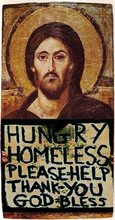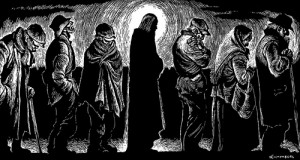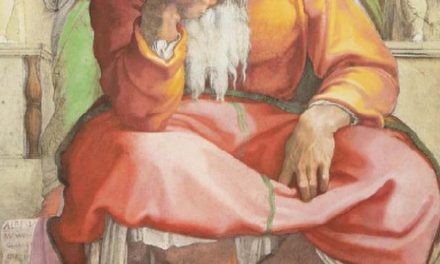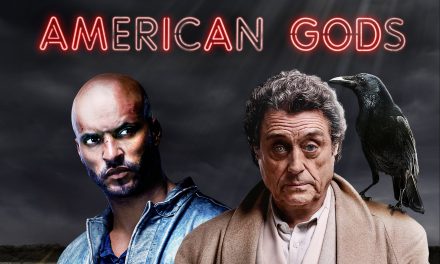Arguing that the budget is a moral document, Rev Jim Wallis and Sojourners magazine has embarked on an admirable and controversial campaign to protect our social safety net. Wallis and his colleagues just completed a Lenten fast for hunger and poverty demonstrating their commitment through an organized collection of religious, political and personal activities.
While the ubiquitous What would Jesus Do? is considered popular and part of most teen-spirituality programs, what would Jesus cut? is proving far more controversial. Debra Saunders of the San Fransisco Chronicle is particularly angry at Wallis’s efforts:
While the Sojourners recognize that the deficit is a “moral issue” – as it would be wrong to “leave a world of debt for our children” – the group warns against reducing the debt “on the backs of poor and vulnerable people.”
Yet, Ryan would counter, the poor and vulnerable stand to lose the most as the looming “debt crisis” could destroy America’s safety net if Washington fails to address the federal debt. The GOP wants to change the focus of welfare programs away from rewarding dependency and toward rewarding independence.
Ryan did not claim to know what Jesus would cut. The Sojourners did. Why, it even knows Jesus believes in global warming.
Reader Glen Franklin Koontz came to a different conclusion. “In the Christian faith, the individual is commanded to love his neighbor as himself… (and) to act charitably and to help others,” he wrote. “Nowhere in the Bible does God command Caesar to do a damn thing.”
I don’t think that Wallis and company understand that the government is not God. And when well-meaning people try to make it a god, they likely will end up with – what? – $14 trillion in debt.
To accuse Wallis of conflating God and the United States government is not only to misrepresent the work of Sojourners, but also misses the heart of the Gospel message. Render unto Caesar is taken as the proof text to push back against Wallis’ claim that 1. The budget is a moral document and 2. As Christians, we must evaluate it based upon Jesus’ concern for the poor, vulnerable and marginalized.
What Saunders, Ryan and others are attempting to do is set up a false dichotomy between the future of the US economy and the social safety net for the poor. The economy is a means to an end, not an end in itself. As Pope Benedict XVI highlighted in Caritas in Veritate and recently reiterated by the Holy See at the United Nations – economic development must be people-centered.
If humans in their full humanity are not viewed as the ultimate goal of development . . . we fear that humans will be seen by many as the primary barrier to development and we can be certain which humans these will be: the poor; the marginalized; the inconvenient; those yet to be born and those who due to age, disability or illness cannot defend themselves.
Recourse to both “render unto Caesar” and setting up a false choice between economic stability and protecting the poor must be rejected. Christian discipleship does not allow viewing our role as Christians and citizens in this way. In their introduction to the 1986 Economic Pastoral, Economic Justice for All, the United States Catholic Bishops clearly state,
Followers of Christ must avoid a tragic separation between faith and everyday life. They can neither shirk their earthly duties nor, as the Second Vatican Council declared, ‘immerse themselves in earthly activities as if these latter were utterly foreign to religion and religion were nothing more than the fulfillment of acts of worship and the observance of a few moral obligations (Pastoral constitution on the church in the modern world, no 43)
They go on to explain why they write – as Catholics, Americans, bishops, and as pastors.
As Catholics, we are heirs of a long tradition of thought and action on the moral dimensions of economic activity. The life and words of Jesus and the teaching of his Church call us to serve those in need and to work actively for social and economic justice. As a community of believers, we know that our faith is tested by the quality of justice among us, that we can best measure our life together by how the poor and vulnerable are treated. This is not a new concern for us. It is as old as the Hebrew prophets, as compelling as the Sermon on the Mount, and as current as the powerful voice of Pope John Paul II defending the dignity of the human person.”
This commitment to protect the poor and vulnerable continues in the current budget debate. And tomorrow, April 27, a new website and coalition including the USCCB (in particular, Bishop Blaire and Bishop Soto) will launch:
A diverse coalition of evangelical, Catholic, Methodist, mainline Protestant, African-American, and Latino Christian leaders will announce a new coalition to fight cuts to anti-poverty programs and congressional plans to make those cuts even deeper. A joint statement released by the coalition—and signed by 32 leaders—states:
As Christian leaders, we are committed to fiscal responsibility and shared sacrifice. We are also committed to resist budget cuts that undermine the lives, dignity, and rights of poor and vulnerable people. Therefore, we join with others to form a Circle of Protection around programs that meet the essential needs of hungry and poor people at home and abroad.”
Even critics of Wallis and the USCCB all seem to concede that the budget is in fact a moral document – but they are uncomfortable with Wallis’s slogan and the further statement that the budget is a statement of our priorities as a society. Presumably, cutting Medicaid, food stamps, and other social safety programs targeting the poor and vulnerable becomes more difficult and thus, Sojourners is criticized for using religion for partisan politics. However, Christian discipleship is not meant to be comfortable. Reflecting back on Holy Week – and the drama of the Triduum liturgy, it is perhaps clearest right now that to share in the Resurrection the Christian must share in the Crucifixion as well. As a Catholic moral theologian, I admire and support Wallis’s campaign. However, I do not think Wallis and the good people of Sojourners go quite far enough. Looking more carefully at Matthew 25 – the question isn’t what would Jesus cut? But are you prepared to take away food stamps FROM Jesus?
In Matthew 25’s Parable of the Last Judgment, Christians are told exactly what criteria by which we will be judged.
When the Son of Man comes in his glory, and all the angels with him, he will sit upon his glorious throne, and all the nations 15 will be assembled before him. And he will separate them one from another, as a shepherd separates the sheep from the goats. He will place the sheep on his right and the goats on his left.
Then the king will say to those on his right, ‘Come, you who are blessed by my Father. Inherit the kingdom prepared for you from the foundation of the world.
For I was hungry and you gave me food, I was thirsty and you gave me drink, a stranger and you welcomed me, naked and you clothed me, ill and you cared for me, in prison and you visited me.’
Then the righteous 16 will answer him and say, ‘Lord, when did we see you hungry and feed you, or thirsty and give you drink? When did we see you a stranger and welcome you, or naked and clothe you? When did we see you ill or in prison, and visit you?’ And the king will say to them in reply, ‘Amen, I say to you, whatever you did for one of these least brothers of mine, you did for me.’
In his book, Being Consumed, William Cavanaugh argues
What is truly radical about this passage is not that God rewards those who help the poor; what is truly radical is that Jesus identifies himself with the poor. The pain of the hungry person is the pain of Christ, and it is thus also the pain of anyone who is a member of the body of Christ. If we are identified with Christ, who identifies himself with the suffering of all, then what is called for is more than just charity. The very distinction between what is mine and yours breaks down in the body of Christ”
In her reflection on Matthew 16:15 “Who do you say that I am?” Mother Teresa offers a powerful answer, beginning with the standard theological statements from the creed (You are the Second person of the Blessed Trinity, etc) and concludes:
Jesus is the Hungry – to be fed.
Jesus is the Thirsty – to be satiated.
Jesus is the Homeless – to be taken in
Jesus is the Sick – to be healed.
Jesus is the lonely – to be loved.
Jesus is the Unwanted – to be wanted.
Jesus is not like the poor. Jesus is the poor. Jesus is not like the unemployed father who cannot find work and for whom food stamps are the only thing preventing his children from going to bed hungry. Christ is not like single mother working two low-paying part time jobs surviving only through access to housing and child care subsidies. Jesus Christ is that father. Jesus Christ is that mother.
Mother Teresa understood this radical identification – and if one looks closely at her actions – they cannot be reduced to mere individual instances of charity. Blessed Mother Teresa organized; she built a system of coordinated and institutional support to attend to the needs of the poor and vulnerable. Christian ethics is not individualistic – we are called to be members of the body of Christ and the Communion of Saints.
The Parable of the Last Judgment and the command to love one’s neighbor as oneself require a preferential option for the poor, vulnerable, marginalized – those without a voice. As the US Bishops clearly stated, the measure of justice in a society is how we treat the least among us. The United States Federal Budget is not only a moral document – it is a statement of our national priorities. Are we a society that prioritizes justice? Or do we prioritize self-interest? If the budget is a statement of our priorities, what are the criteria the Christian should use to evaluate this moral document? There are three, as detailed by Fr. David Hollenbach, SJ
“The needs of the poor take priority over the wants of the rich. The freedom of the dominated takes priority over the liberty of the powerful. The participation of marginalized groups takes priority over the preservation of an order which excludes them.”
And so we come back once again to Matthew 25 – the fundamental question of Christian discipleship is how we treat the least among us. For it is in the encounter with the poor, the unemployed, the sick, the undocumented, the homeless, we meet Christ. This is both an individual call and a call to the community.
And so, when Matthew 25 concludes:
Then he will say to those on his left, ‘Depart from me, you accursed, into the eternal fire prepared for the devil and his angels. For I was hungry and you gave me no food, I was thirsty and you gave me no drink, a stranger and you gave me no welcome, naked and you gave me no clothing, ill and in prison, and you did not care for me.’ Then they will answer and say, ‘Lord, when did we see you hungry or thirsty or a stranger or naked or ill or in prison, and not minister to your needs?’ He will answer them, ‘Amen, I say to you, what you did not do for one of these least ones, you did not do for me.’
As Christians, will we prepared to answer? Or, will we be caught off-guard when Jesus holds us accountable not only for our individual “acts of charity” but also our denial of social support for food banks, food stamps, Medicaid, and programs to fight homelessness?








Trackbacks/Pingbacks